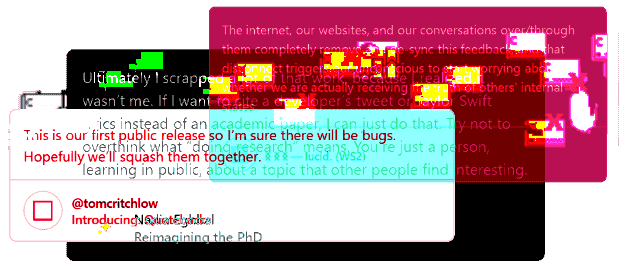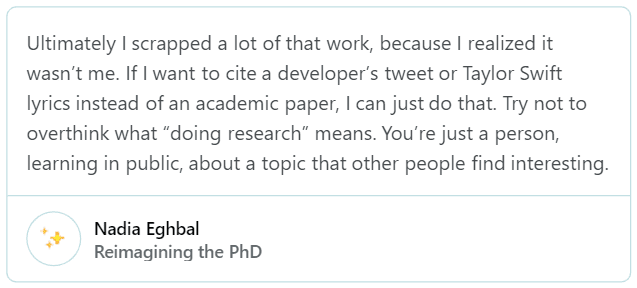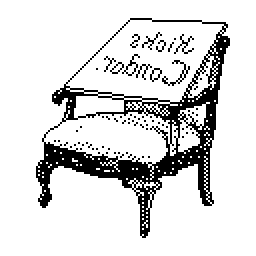

Admiring the Quotebacks Strategy
The new extension by @tobyshorin and @tomcritchlow is textbook. Hypertextbook.
You might think that the Quotebacks extension - for being a piece of rather simple tech - is being talked about enough already. But I think we need to slow down and look at this closer. (Are we few? Those remaining Web devotees…)
And, yes, the website says that Quotebacks does three things. But I’m just going to talk about it as if it did one thing: gives people a common format for embedding quoted stuff.
Looks like this:
Fuck that. I'm more of an editor than a developer any day, but I'll be damned if I'm going to cede that territory. I dont want to pour my words into a box, the parameters of which someone else decides (and obscures). I want to make the box, too. And remake it. And, hell, break it from time to time. It's mine to break.
Select the text. Copy it into the extension. And it’ll give you embed tags. (Much like YouTube does for embedding videos or Twitter does for embedding tweets.)
So. This is a cool extension - but also very sneaky and strategic. Something like this can actually draw people back to the Web. A bit of stylistic appeal paired with some subconscious luring.
The primary advocacy strategy on the Web for the last ten years seems to have been to write a blog post saying, “Hey, stop what you’re doing and write blog posts!” Unfortunately that offers nothing appealing to offset the risk of blogging on a seemingly empty Web. Especially for people who tried blogging already. (“Come on - I swear - people are still out here!!”)
Think of the appeal of ‘likes’ on social media. There was a lot of excitement around this kind of participation. Hey, likes - I could do that! I could get some likes! At the very least, I could give out a few - and I might get some back. Great!
A quoteback is a like, too, actually. It’s just a full paragraph one.
Likes are the most atomic way - the most basic way - of participating in social media. And perhaps the quoteback is the most atomic form of participation on the Web.
This suggests that people are quoting each other a lot on the Web.[1] This suggests that you will be quoting others and they will be quoting you.[2] There is an automatic action implied - a subconscious luring - that one should begin by reading. By finding quotes to quote.
And I think this is an excellent mindset to be in.[3]
Furthermore, this positions the Web as a container. The Web has already become a place to embed other network content. You don’t embed social networks into each other - you embed into HTML. This makes the Web a wrapper for every other kind of network. And the glue between networks.
Quotebacks can fabricate an image for social networks. Check it out.

An acute reminder of hypertext sterilization on those Webs.
So, sure, go to the social networks to do detail work and messaging. But come back out to the Web to assemble it all into more encompassing creations. Essays, guides, journals and such.
The novel styling of quotebacks is not immaterial. The elegant formatting - and even the slight hover effect - creates desire to be quoted. Just as reading a book with gorgeous typesetting and paper aroma alone fills one with desire to write. (“This book sucks - but I can almost picture the book that might live up to a binding of this quality…”) The styling gives the Web texture and physical appeal that it is distinctly lacking.
If the Web is going to be treated as a place to drop embeds, this extension embraces that. Here are some more good-lookin’ embeds for ya.
And I actually hope that quotebacks become a more general thing. Imagine if you could snip video or podcast segments and spit out a block that is also recognizable as a quoteback. The Web contains and wraps those fragments, seeds in its garden.
Now, of course, I’m raving about something that is truly quite simple.
Am I dense? I'm still at such a loss on the https://quotebacks.net thing that I feel like I must be missing something. I don't feel like "blockquotes don't have a fancy, common-design embed like tweets and grams do" is some sort of pressing obstacle for blogging?
Isn’t this just a quotation or citation? Haven’t these been around for centuries? Can’t I just use the blockquote?
Absolutely. I, personally, am sticking to the blockquote - because I already have a convention going for myself.
But it’s still appealing. This is inviting me to do something that I’m already doing. In a way, the fact that this is such a slight change - so simple and familiar - just tweak your copy-and-paste to get some slight advantage - almost guarantees that it will do well.
Anyway - I applaud this strategy. Creating new protocols for the Web is cool - but it implies more work for everyone. If you can help modernize the existing Web by adding tools that enhance it as a container, that encourage reading and which perhaps offer a way of understanding what it means to participate here - seems exquisite, right?
Or, specifically, in blogging or expert wiki-ing or ‘networked writing’ as Critchlow puts it. ↩︎
Which is already somewhat the format of e-mails, though it’s unnatural to quote different sources there. ↩︎
With so many networks focused on tool for creation - here are the ways you can use videos, use stickers, filter yourself, sprinkle yourself with three-dimensional face dust, lower your pitch, tag yourself - I think it’s a smart counter-strategy to swing the other direction - here is something you can do with what someome else has said. Begin by reading, not by pressing REC. ↩︎




